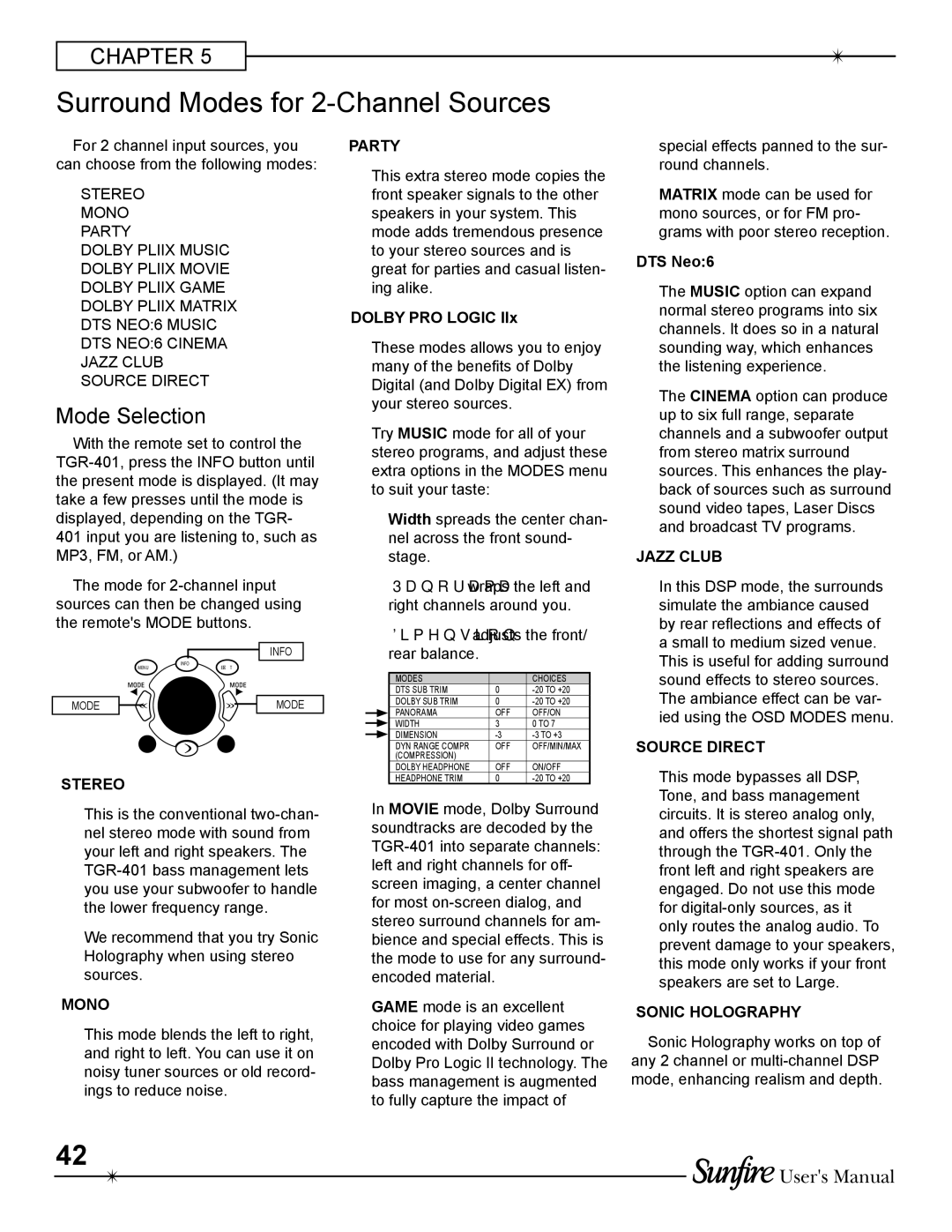
CHAPTER 5
Surround Modes for 2-Channel Sources
For 2 channel input sources, you can choose from the following modes:
STEREO
MONO
PARTY
DOLBY PLIIX MUSIC
DOLBY PLIIX MOVIE
DOLBY PLIIX GAME
DOLBY PLIIX MATRIX DTS NEO:6 MUSIC DTS NEO:6 CINEMA JAZZ CLUB SOURCE DIRECT
Mode Selection
With the remote set to control the
401 input you are listening to, such as MP3, FM, or AM.)
The mode for
INFO
INFO
MENUEXIT
MODE | SEL | MODE |
STEREO
PARTY
This extra stereo mode copies the front speaker signals to the other speakers in your system. This mode adds tremendous presence to your stereo sources and is great for parties and casual listen- ing alike.
DOLBY PRO LOGIC IIx
These modes allows you to enjoy many of the benefits of Dolby Digital (and Dolby Digital EX) from your stereo sources.
Try MUSIC mode for all of your stereo programs, and adjust these extra options in the MODES menu to suit your taste:
Width spreads the center chan- nel across the front sound- stage.
Panorama wraps the left and right channels around you.
Dimension adjusts the front/ rear balance.
MODES |
| CHOICES |
DTS SUB TRIM | 0 | |
DOLBY SUB TRIM | 0 | |
PANORAMA | OFF | OFF/ON |
WIDTH | 3 | 0 TO 7 |
DIMENSION | ||
DYN RANGE COMPR | OFF | OFF/MIN/MAX |
(COMPRESSION) |
|
|
DOLBY HEADPHONE | OFF | ON/OFF |
HEADPHONE TRIM | 0 |
special effects panned to the sur- round channels.
MATRIX mode can be used for mono sources, or for FM pro- grams with poor stereo reception.
DTS Neo:6
The MUSIC option can expand normal stereo programs into six channels. It does so in a natural sounding way, which enhances the listening experience.
The CINEMA option can produce up to six full range, separate channels and a subwoofer output from stereo matrix surround sources. This enhances the play- back of sources such as surround sound video tapes, Laser Discs and broadcast TV programs.
JAZZ CLUB
In this DSP mode, the surrounds simulate the ambiance caused by rear reflections and effects of a small to medium sized venue. This is useful for adding surround sound effects to stereo sources. The ambiance effect can be var- ied using the OSD MODES menu.
SOURCE DIRECT
This mode bypasses all DSP, Tone, and bass management
This is the conventional
We recommend that you try Sonic Holography when using stereo sources.
MONO
This mode blends the left to right, and right to left. You can use it on noisy tuner sources or old record- ings to reduce noise.
In MOVIE mode, Dolby Surround soundtracks are decoded by the
GAME mode is an excellent choice for playing video games encoded with Dolby Surround or Dolby Pro Logic II technology. The bass management is augmented to fully capture the impact of
circuits. It is stereo analog only, and offers the shortest signal path through the
SONIC HOLOGRAPHY
Sonic Holography works on top of any 2 channel or
42
![]() User's Manual
User's Manual
